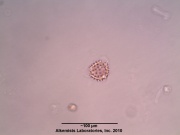Calendula officinalis (flower)
From AHPA Botanical Identity References Compendium
(Difference between revisions)
m |
|||
| Line 2: | Line 2: | ||
=Macroscopic Entries= | =Macroscopic Entries= | ||
=Microscopic Entries= | =Microscopic Entries= | ||
| − | {{Microscopy | source=Elan M. Sudberg, Alkemist Laboratories | + | {{Microscopy | source=Elan M. Sudberg, Alkemist Laboratories |
| companyimage= AP-LOGO-Laboratories Crop - Copy.jpg | | companyimage= AP-LOGO-Laboratories Crop - Copy.jpg | ||
| companyURL=http://www.Alkemist.com | | companyURL=http://www.Alkemist.com | ||
| Line 11: | Line 11: | ||
| caption2=Fibrous layer of anther in surface view from Calendula officinalis flower viewed at 400x with Acidified Chloral Hydrate Solution. | | caption2=Fibrous layer of anther in surface view from Calendula officinalis flower viewed at 400x with Acidified Chloral Hydrate Solution. | ||
| characteristics=cellular structures identified in Calendula officinalis flower are the large spherical pollen grain showing sharp spiny exine with three pores and a fibrous layer of anther in surface view when observed at 400x with Acidified Chloral Hydrate Glycerol Solution. | | characteristics=cellular structures identified in Calendula officinalis flower are the large spherical pollen grain showing sharp spiny exine with three pores and a fibrous layer of anther in surface view when observed at 400x with Acidified Chloral Hydrate Glycerol Solution. | ||
| + | | reference=British Pharmacopoeia, 2003 | ||
| }} | | }} | ||
Revision as of 05:02, 3 October 2012
Contents |
Introduction
Macroscopic Entries
Microscopic Entries
|
HPTLC Entries
Other Points of Interest
Cite error: <ref> tags exist, but no <references/> tag was found

